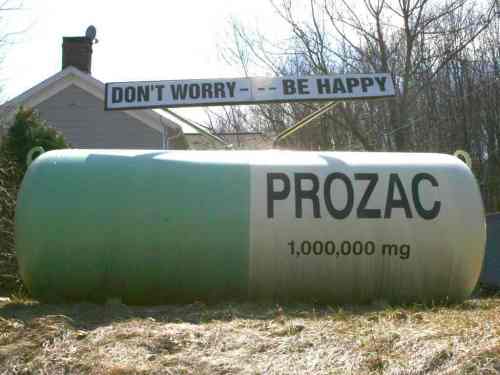
My existence is a dreadful burden: I would have rejected it long ago, had I not been making the most instructive experiments in the intellectual and moral domain in just this condition of suffering and almost complete renunciation — this joyous mood, avid for knowledge, raised me to heights where I triumphed over every torture and all despair. On the whole, I am happier now than I have ever been in my life. And yet, continual pain; for many hours of the day, a sensation closely akin to seasickness, a semi-paralysis that makes it difficult to speak, alternating with furious attacks (the last one made me vomit for three days and three nights; I longed for death!). F. Nietzsche, Letter to Dr. O. Eiser, January 1880
Would Nietzsche have taken Prozac? The intensity and frequency of his migraine attacks would certainly make him a candidate for modern preventive therapy. [1] Virgina Woolf, Miguel de Cervantes, Lewis Carroll, and Peter Tchaikovsky might also be given the nod. According to a review article published in the May 2009 Mayo Clinic Proceedings [2] preventive therapies are commonly underused in patients who may be appropriate candidates and who may benefit from treatment. The American Migraine Prevalence and Prevention survey states that 38.8% of migraineurs “should be considered for preventative treatment.” However, the Mayo Clinic article makes no mention whatsoever of Prozac and goes on to praise the anticonvulsant topiramate for headache prevention.
There seems to be a great deal of confusion about the best preventive medications for migraine. Prozac (fluoxetine) is just one of many drugs that have been and are being tried on suffering patients, everything from feverfew to ergotomine to botulinum toxin. Research is ongoing, of course. But despite gaps in the literature and promising evidence for some of the competition, Prozac is commonly prescribed for migraine prophylaxis. [14] A little casual investigation reveals that hard evidence to support its use is, in fact, lacking. Moreover, what evidence there is comes from a few studies done more than a decade ago.
The two most relevant Cochrane reviews are inconclusive. Cipriani, et al. (2005) found statistically significant differences in terms of efficacy and tolerability between fluoxetine and certain other antidepressants, but concluded that the clinical meaning of these differences was uncertain and that no definitive implications for clinical practice could be drawn from them. [3] Moja, et al. (2005) found that selective serotonin re-uptake inhibitors (SSRIs) like Prozac were no better than placebo for preventing migraine. [4]
One of the leading headache textbooks, the aptly named Wolff’s Headache, takes no heed of the Cochrane information and confidently asserts the prophylactic efficacy of Prozac. The studies it cites are from the early 1990s. [5,6,7] Curiously, in its own review of Prozac for migraine prevention, the US Headache Consortium cites completely different studies from the same decade. [9,10] The Consortium’s guideline [8] cautiously approves the use of Prozac based on some favourable outcomes from the cited studies.
Borkum’s Chronic Headaches (2007) barely mentions fluoxetine prophylaxis. [11] Another text, Migraine and Other Headache Disorders (2006) merely nods in the direction of SSRIs, [12] admitting that the mechanism by which antidepressants work to prevent headache is uncertain (p. 319). The editors of The Headaches (2006) also make a brief mention of the 1994 Saper study [7] which “found fluoxetine 20 to 40 mg/d more effective than placebo in the last month of a 3-month study.” [13] In his chapter on chronic migraine in Advanced Therapy of Headache (2005) Silberstein asserts that Prozac is “coming into wider use for daily headaches” (p. 104). [14]
But here is the summary from BMJ Clinical Evidence:
Compared with placebo SSRI antidepressants may be no more effective at reducing headache symptoms (very low-quality evidence).
Compared with amitriptyline We don’t know whether SSRI antidepressants are more effective at reducing headache duration (very low-quality evidence).
I could go on …
So why is Prozac being prescribed to thousands for relief of their migraine headaches? Beats me. Especially when harms associated with the use of Prozac are well described. (See the alerts published on the FDA website.) What would Nietzsche do?
David Healy’s warning is still relevant:
Since the development of anesthesia, physicians have been prepared to do harm to a few patients in order to benefit a majority of patients. The de facto Hippocratic Oath has always been: Do no harm to a majority of your patients. In the case of the SSRIs, the clinical trial evidence indicates that we may benefit some patients. None of this evidence shows us what proportion of patients benefit from SSRI treatment and what proportion are harmed by it. In the case of anesthesia, much less than 1% of takers are at risk. In the case of the SSRIs, there is a serious risk to far more than 1% of takers, but neither society nor the psychiatric profession has expressed a view as to what constitutes an acceptable minority of harmed patients. [15]
References
1. Hemelsoet D, Hemelsoet K, Devreese D. The neurological illness of Friedrich Nietzsche. Acta Neurol Belg. 2008 Mar;108(1):9-16.
2. Buse DC, Rupnow MF, Lipton RB. Assessing and managing all aspects of migraine: migraine attacks, migraine-related functional impairment, common comorbidities, and quality of life. Mayo Clin Proc. 2009 May;84(5):422-35.
3. Cipriani A, Brambilla P, Furukawa T, Geddes J, Gregis M, Hotopf M, Malvini L, Barbui C. Fluoxetine versus other types of pharmacotherapy for depression. Cochrane Database Syst Rev. 2005 Oct 19;(4):CD004185.
4. Moja L, Cusi C, Sterzi R, Canepari C. Selective serotonin re-uptake inhibitors (SSRIs) for preventing migraine and tension-type headaches. Cochrane Database of Systematic Reviews 2005, Issue 3. Art. No.: CD002919.
5. Silberstein SD, Lipton RB, Dodick DW. Wolff’s headache and other head pain. 8th ed. New York: Oxford; 2008. p.353.
6. Bussone G, Sandrini G, Patruno G, et al. Effectiveness of fluoxetine on pain and depression in chronic headache disorders. In Headache and depression: serotonin pathways as a common clue (G Nappi, G Bono, G Sandrini, et al., eds), pp. 265-272. New York, Raven Press;1991.
7. Saper JR, Silberstein SD, Lake AE, et al. Double-blind trial of fluoxetine: chronic daily headache and migraine. Headache 1994;34:497-502.
8. Ramadan NM, et al. Evidence-based guidelines for migraine headache in the primary care setting: pharmacological management for prevention of migraine. US Headache Consortium. Available from: http://www.aan.com/professionals/practice/pdfs/gl0090.pdf
9. Adly C, Straumanis J, Chesson A. Fluoxetine prophylaxis of migraine. Headache. 1992;32(2):101-104.
10. Steiner TJ, Ahmed F, Findley LJ, MacGregor EA, Wilkinson M. S-fluoxetine in the prophylaxis of migraine: a phase II double-blind randomized placebo-controlled study. Cephalalgia. 1998;18(5):283-286.
11. Borkum JM. Chronic headaches: biology, psychology, and behavioral treatment. Mahwah NJ: Lawrence Erlbaum; 2007.
12. Lipton RB, Bigal ME. Migraine and other headache disorders. New York: Informa Healthcare; 2006.
13. Olesen J, Goadsby PJ, Ramadan NM, Tfelt-Hansen P, Welch KMA. The headaches. 3rd ed. Philadelphia: Lippincott Williams & Wilkins; 2006.
14. Silberstein SD. Chronic migraine without medication overuse. In, Purdy RA, Sheftell FD, Rapoport AM, Tepper SJ. Advanced therapy of headache. 2nd ed. Hamilton ON: BC Decker; 2005.
15. Healy D. Let them eat Prozac. Toronto: James Lorimer; 2003. p. 380


